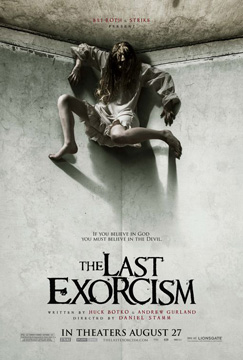 The Last Exorcism (my review) was a surprisingly good little flick. I went in expecting something visceral and sensational and was greeted with a small, character-driven film with a lot of really nice performance work and an ending that surprised me. In a good way.
The Last Exorcism (my review) was a surprisingly good little flick. I went in expecting something visceral and sensational and was greeted with a small, character-driven film with a lot of really nice performance work and an ending that surprised me. In a good way.
As the film arrives on home video, I had the chance to speak with star Patrick Fabian about his work as Cotton Marcus, a man who has lost his faith and the fateful journey he takes to to exorcise a demon from a young lady out in the sticks.
Nick: I have to say. The movie surprised the hell out of me when I saw it in theaters. As somebody who covers genre films very extensively, it was really nice to see something that wasn’t what it appeared to be on the surface and I kind of wanted to get your take as to how much of that was planned, like to make this sort of a character study under the guise of a bad-ass genre horror film.
Patrick: Fifteen minutes are heavily shown in trailers. You know, I think that got people excited to see a certain type of film. The original script title was called “Cotton”. So it was sort of designated from the beginning as sort of a you know we’re doing a character study on this guy. But I think the reality of, you know, making the movie and wanting people to see it, as many people as possible, if you call it “Cotton” the very next question you get is “What’s that?”. They’re already talking about something as opposed to saying “I know what I’m going to go see.” So I think in terms of them calling it The Last Exorcism I think they did the right thing. And I think if you go in to see the film and you’re looking for a body count, you’re going to be disappointed no matter what. But if you go in to get creeped out and have some horrific moments, I think the film absolutely delivers and because of the way that Daniel Stamm shot it along with Zoltan Honti the cinematographer, and the great storytelling, and uh, I think I lot of people went and saw the film, at least the feedback I got, where they settled in and there’s a moment in the theater where people get shocked back into, “Oh wait, I’m at a film called ‘The Last Exorcism‘!”
Nick: Yeah, that’s, I’m actually a big fan of using the marketing that way because I think most discerning filmgoers should know better now than to completely go at face value what they see in the advertisements. There’s a job to do, there’s a lot of money at stake, but ultimately what I love about that is, is that I bet you a nice percentage of your audience were people that were there for the superficial and visceral reaction of what a horror film on a Friday night brings, but you kind of snuck them in with something that’s actually really character driven. I think that’s really wise, and I think that’s the only way that people expand their tastes in some of this genre stuff.
Patrick: Oh yeah, I have to say, I’ve been very fortunate, you know, and very pleased with the response that we’ve gotten critically. You know? A lot of nice things have been said about Ashley and my performance. And it talks about how the genre, this just shows that the genre actually can support a storyline that’s not a body count every 30 seconds you know? And I think that breathes some new life and give some other film makers a new ability to make a take on it, you know? And that you can find the horror in a whole bunch of areas, you know?
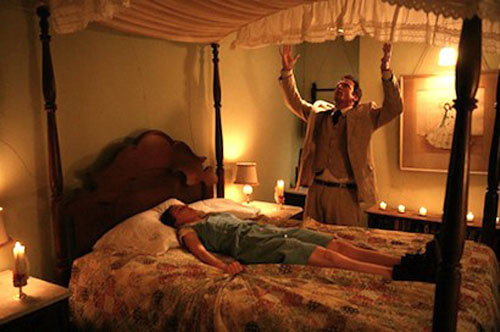
Nick: Yeah. Absolutely And I think it’s interesting that you guys did it in the documentary style because some people attribute that to a specific genre staple but at the same time, people are so used to being stuck in reality at that point so when things get, when the shit hits the fan late in the film, I think a lot of people aren’t prepared for it which is effective as hell.
Patrick: Well, you know, I think also, you know, somebody asked me about The Exorcist versus this. And I said, you know, they share a story quality in that it’s good versus evil it’s a man who struggles with his faith, but in terms of the storytelling I think Daniel has updated the ability to tell, because you were talking about people who, you know, post everything on Youtube, everybody is making their own little videos, we’re all so used to seeing the world through this lens that the fact that we announce that we have a cameraman here immediately unhinges us from that sense of like we’re sneaking in on anything. And if anything is getting snuck in on us shot-wise it’s because the cinematographer’s doing it. What I like about Zoltan Honsi, you know you mentioned about how it gets crazy at the end, his restraint in having the handheld is so good in the first two thirds of the film that I think you forget the camera is there and I think that’s a real testimony to him. Because he sort of comes in and eavesdrops on stuff, and then we start watching what’s going on, and I’m connecting with the audience, and that sort of thing. So by the time that the camera stuff really does start getting, you’re noticing the camera, it’s because it’s emotionally involved. It’s because, well the cameraman is running or the cameraman is freaked out, or we’re nervous, and I think that does really lend itself to making the last bit of the film work.
Nick: Working with Ashley on the really intense scenes where she’s obviously displaying a lot of the stuff that folks see in the trailer. What was it like? What was it like putting that together and creating that authenticity, and where did she end and that character begin in terms of the turmoil she was going through?
Patrick: Wow. You know, this is the first time I’ve worked with her. And it’s funny, you know, I’ve been around for a while, about twenty something years, and this is like her first big film. And she just started off in the business. And what she brought to it, I can’t commend enough you know? I can be as good as I want to be as the preacher, but if you don’t believe the possessed girl in an exorcist film? You don’t have a film in my opinion. And we have a film because she’s so committed, and she’s so committed on both sides of the coin. Like when we first meet her, you know, as Nell, I think there’s that innocence that everybody in the audience sort of slides to that says “Oh, I want to help you. What can I do for you?”. But then when she’s freaked out and possessed, we’re also equally scared because we saw what she was before. And as an actor, she brought commitment to both levels of that. You know, I got to meet her, we got to shoot the film basically in order. So as I’m interviewing Nell and getting to know her I’m also getting to know her as an actress. So by the time we get to the exorcism scenes, you know there’s no CGI involved with any of the actors, she does all of that physical stuff herself. And then it’s alarming to look at on screen, it’s alarming to look at in person let me tell you. So all I had to do was suit up and show up and I was genuinely creeped out, genuinely freaked out watching her, you know? And it was a very intense couple of days shooting of stuff.
Nick: What was it like for you being sort of initiated into the hardcore horror world? With the build up of the film, and the release, and then the audience’s response. Was that a new world for you?
Patrick: It was. I forget the depth at which that travels, and you know I’m still a fourteen year old boy at heart, I grew up on these films. You know, the Friday the 13ths, all that stuff came out just when I was hitting thirteen and fourteen years old. So I grew up on those hack and slashers, Nightmare on Elm Street and whatnot. But my preference is for things like The Sentinel. Burnt Offerings. The Dark Secret of Harvest Home. Stuff that implies the creepiness around it. I don’t mind the body count, I definitely go for that to a degree, but I think there’s much more shock value in something that could seem real. That’s the stuff that would make me keep the lights on. An arrow in my eye isn’t going to freak me out as much as somebody quietly putting a pair of scissors in a shoe box and sliding it under her bed. You know what I mean?
Nick: Yeah. Well, there’s a reason those films are still remembered. I mean, look at The Exorcist‘s appeal. If it didn’t have the character stuff, and the depth that like reaches deep into your soul, I don’t think they would still be talked about.
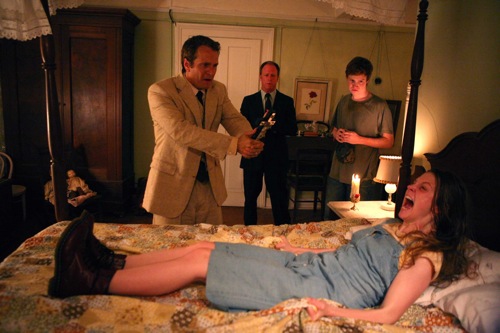
Patrick: No, no. And you know what’s great? To the point of your question, though, people come out of the…people are devoted at the heart. I think because we’re all looking for that scare again. I’m looking for that first time I saw Alien and I almost shit my pants. You know? That’s what I’m looking for. That’s the thrill. That’s the Friday night, communal, let’s get in front of the glowing fire and see our mortality. I mean, that’s what’s thrilling. You know somebody asked me about, you know, why horror films get overlooked for awards and acting awards. And my thought is, there’s no way they should because in the end what’s more real than being afraid? Talk about an emotion that you’re evoking on an audience, the problem is that the genre does get filled with a lot of stuff that lowers the bar for lack of a better word. That goes for the cheap thrill as opposed to the more sophisticated stuff.
Nick: Well, as a discerning horror fan when the ending came about I knew it was going to be very divisive with the audience because it is a very hard turn. And I for one loved it. I was very surprised that it went where it went. And obviously I won’t talk about details and all that. But when you first read that moment in the story, was that, what was your reaction to that initially?
Patrick: Well, you know. That ending evolved as we were going on as a lot of it did. There was a lot of discussion of how to create the ending that we wanted. And that also was in terms of after telling the story for three quarters of the way, where do we go with this? And that really came down to, I think Eli, Daniel and the writers crafting something that was going to satisfy, and as you said it takes a turn, and the film makers were very happy with making that turn and providing a different adrenaline rush at the end than you’d been used to seeing at the beginning. I know that’s sort of obliquely talking around it. I mean, basically, we would be thrown out what we would be doing on the day, on the day. You know what I mean? So it would sort of be unveiled to us as we were shooting, which was a great way of keeping it fresh for us.
Nick: I think the best horror films are divisive. And they do create discussion. And I think that as good as the film is in it’s first three acts, like right up until the last twist there, there is that “Okay, this is this kind of film, it has to end in a place that we’re familiar with, or else, we just haven’t been prepared for this.” And I think that’s great about it. And I know that people on our site and our message boards were very opinionated in a variety of different matters. And I think that’s great. I think that what it does, it gives the film a little bit of an attitude to it that it normally wouldn’t have had probably.
Patrick: If we ended it some other way the audience actually would feel gypped. They’d be like “What do you mean it’s sort of this thing?”. And I was talking about the idea like the end of Inception. You know? Does the totem keep spinning, or does it fall? I don’t know. But does it ruin the film that you just watched behind it? If you don’t know that answer definitively, does it ruin what you just watched? And for me it doesn’t. For me it does provide a bunch of things, and I have people come up to me after The Last Exorcism like “Wow, man, I can’t believe this is what happened!” and I go, “Really, that’s what you think happened?” and they go “Yeah, that’s obviously what happened.” And it’s totally opposite of what somebody else interprets out of it.
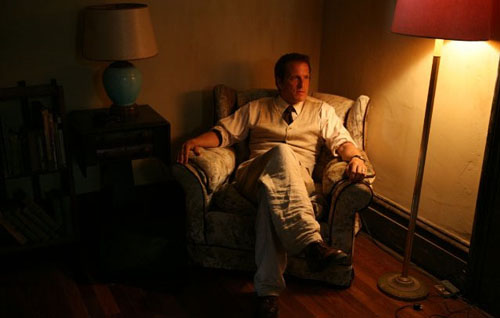
Nick: Yeah. Have you heard about any plans to continue this story?
Patrick: You know, the best thing I heard about continuing this story was on opening night in Los Angeles. Quentin Tarantino saw the film of course because he’s great friends with Eli Roth. And Quentin came up to me afterwards and said, “Man, that was so good! It was so good! I want to know what happens with Cotton! I want to see where Cotton goes with the rest of his life!”. And I just thought quietly to myself, “Quentin, if you would like to film that I would be more than available.”
Nick: Yeah, he still hasn’t done his horror film yet. As big a nerd as he is, you know it’s going to be just nuts.
Patrick: Well, From Dust Til Dawn. I thought that had a creepy element until it became the shoot em up spaghetti western that it was.
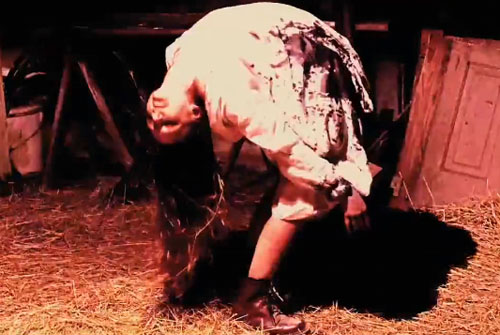
Nick: Right, but the Tex-Mex Robert Rodriguez influence didn’t make it wholly Tarantino. So it was kind of like, I want to see him let go in the way that he did with Inglorious, with all the tools he’s got, it would just be insane. How involved was Eli with the project?
Patrick: Eli was fantastic. You know, I can’t thank him enough. Without his green lighting it, by having it cross his desk and say “I would like to participate in this,” none of this happens. And then from that point on, his enthusiasm for the project was always good. When he was in New Orleans, he came down and just, you know we’re making a film and everybody gets a little, you know, you’re on the bus together for a long time and start to get a little sluggish and you’re not sure what you’re doing and you kind of hate everybody, and nobody looks pretty, you know that sort of thing?
Nick: Yeah.
Patrick: He’d come down and remind us that what we were doing was good, and reminded us to keep it real, because it was the only way that we’d be able to keep the audience. That we couldn’t have a false moment. And to make it scarier. And I have to say for the record, I always refer to as this is definitely an Eli Roth produced film, but this is definitely directed by Daniel Stamm. It was Daniel who was there day in and day out creating that mood for the actors and working with Zoltan Hansi the cinematographer to get the feel. And he would take us through twenty and thirty takes at a time and I’ll be honest with you, it was driving me batshit. I was like, “Are you kidding me?” I’m like, “We have this, don’t we have this?”. And he would keep going and going and going, and basically breaking me down in subtle ways that I as an actor of course were unaware because as a Director he was looking for. And then when I saw the finished product, I realized what he was talking about. You know, that there can’t be a dishonest moment on the screen because we’re so right in there. And if there is a dishonest moment, it’s going to pull the audience out and ruin the film and I think he achieved that by the way he directed us.
Nick: Yeah, no, to your point about Eli Roth. A lot of times when you have a big name in horror and there are films that are produced by them, it seems as if everything was shoehorned to make it feel like one of their films. And this doesn’t remind me in any way of an Eli Roth film. It’s completely different, and there was that compulsion by watching the trailers like, “Okay, is this going to be really kind of pushing the envelope?” and I was really surprised, it showcases a nice restraint and the ability to let people do their work and serve as sort of a security blanket for them. It was really nice. It actually enhanced my appreciation for what he does so that’s cool.
Patrick: Well, you know me too. Because I thought the same thing that you did. I thought, “Oh no, Eli’s involved,” you’re like, “he’s going to come in and pseudo-direct or he’s going to make sure there’s a signature this or that.” And he was not. He was all about letting the film maker, because he knew what it was like to be a film maker and have somebody let him do what he was going to do. So it showed a real maturity on his part, and it’s definitely carving out a brand new career for him as a mentor. You know, as young as he is he’s certainly a kingpin of this genre and as a mentor. And I think you know it goes to people who saw Eli’s name, and saw the trailer, and immediately got mad that there weren’t Czechoslovakian girls showing their tits in the first fifteen minutes. You know what I mean? You’re not going to satisfy those people no matter what if they’re looking for Hostel 6.
Nick: Well yeah, but then again somebody will pop on Youtube and throw a few in and then it will all be good. Before you go, is there anything you’ve got in the pipeline that I can tell our readers about?
Patrick: Yeah. It’s 180 degrees away from the horror genre and playing a preacher, but I just wrapped up twelve episodes of a sitcom called Working Class. And that’s going to be premiering January 28th, on Country Music Television, it’s their first scripted program, and it stars Melissa Peterman, Ed Asner and myself.
Nick: Ed Asner, still busting ass at what 80 something years old?
Patrick: He is. He’s awesome. He’s awesome, he’s funny, he’s cranky, he’s salty. I’ve had a blast working with him, I’ve got to tell you. It’s been an education.
Nick: Awesome. Well, thanks for your time. You did a great job in the movie, and I’m looking forward to seeing you in some horror films down the line man.
Patrick: Great, thanks Nick. You take care, man.
Nick: Take care.
You can buy The Last Exorcism from CHUD.com right here.
Thanks to Brian for the transcription help!